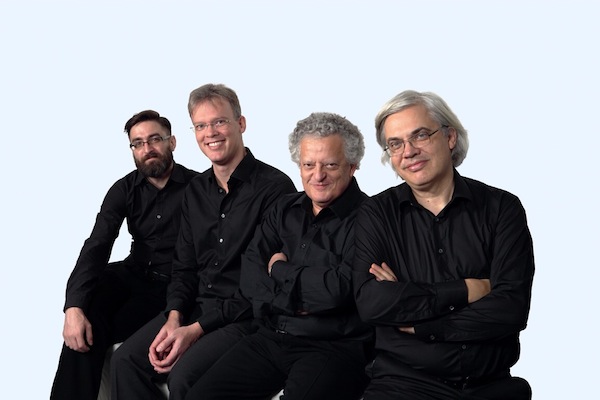Arditti Quartet launches UC’s Ligeti series in style
Just before he sat down to play Friday night at Mandel Hall, a string suddenly snapped on Irvine Arditti’s violin. “They don’t make ’em like they used to,” he observed, telling the audience “I’ll be right back” as he exited the stage for a quick repair. “That usually happens in the middle of the piece,” added violist Ralf Ehlers.
That bit of repartee by members of the Arditti Quartet provided an amusing prelude to the launch of the University of Chicago Presents’ season-long series spotlighting the music of György Ligeti. The brainchild of UC Presents’ executive director Amy Iwano, the ambitious project will offer seven concerts and ancillary university events through March, with participating artists including pianist Pierre-Laurent Aimard, Third Coast Percussion, eighth blackbird and the Imani Winds.
It was an inspired idea to kick off the series with the Arditti Quartet. Founded in 1974 by Irvine Arditti and still led by the first violinist, the ensemble has been a contemporary music champion for over four decades, premiering hundreds of works from Abrahamsen and Adès to Stockhausen and Xenakis.
The Arditti Quartet enjoyed an especially close relationship with Ligeti, working with the Hungarian composer often in preparing concerts of his music. The ensemble performed Ligeti’s String Quartets Nos. 1 and 2 Friday night in Hyde Park. (Ligeti’s Third Quartet, intended for the Arditti, was never completed and exists only in sketches.) Each work was preceded by a quartet of Béla Bartók, highlighting elements that influenced Ligeti on the way to finding his own compositional voice.
Ligeti’s Quartet No. 1, subtitled “Metamorphoses nocturnes,” is an early work dating from 1953-54, cast in a single 20-minute movement. The composer himself termed it “pre-Ligeti” in style and “still very much in the Bartók tradition,” stating that his music didn’t enter stylistic maturity until his Artikulations and Apparitions of 1958. Still, despite the looming Bartók shadows, many Ligeti handprints are there in the polished craft and precision of these surging, constantly morphing variations.
At times Friday one wanted greater sonic impact in Ligeti’s more uninhibited pages. But the Arditti Quartet made much of this score’s mercurial shifts and dizzying contrasts–from the atom-blasted activity and weird rustling delicacy to the satiric descants in the ironic waltz. Amid all the strident, whirring fury, the players were at their finest in the sudden moments of stillness–the spare solo lines in the Adagio and the island of calm the players bestowed in the Andante tranquillo.
Irvine Arditti’s technique is amazingly intact after four decades and one was continually struck by the focus and purity of his violin playing in high notes. All the quartet members brought impressive concentration and commitment to this performance, with the otherworldly benedictory calm of the Lento coda especially well done.
Ligeti’s String Quartet No. 2. from 1968, is one of the composer’s undisputed masterworks. The composer’s mature style is here on full display in five tortuously challenging movements, with even more seismic contrasts and extreme dynamics than in its predecessor.
If one felt the Arditti players holding back in the previous works, they gave free rein to Ligeti’s violent upheavals and wide, wide dynamics. From the barely audible rustling to the sudden jarring outbursts, the musicians put across the sonic tumult with a joyous swing and swagger. In the becalmed stasis of the second movement, the Arditti’s metallic pizzicatos broke in like ricocheting bullets.
Perhaps the middle movement was a bit too amiable, the pizzicatos here missing the relentless mechanical quality. The brief fourth movement was duly furioso, but the performance reached its peak in the finale. Much of this music hovers on the edge of audibility and the Arditti players conjured a compelling, rarefied landscape with an unearthly array of hues and textures that had one sitting on the edge of one’s seat.
It was a fine idea to precede each of the Ligeti quartets with music of Béla Bartók. Ligeti acknowledged his older compatriot’s influence, especially in the First Quartet, which derives from Bartok’s Third Quartet in both its variation style and single-movement structure. Likewise, the fourth movement of Bartók’s Fourth Quartet has a younger cousin in the hard “meccanismo di precisione” pizzicatos of Ligeti’s Second.
Yet the Bartók performances were not quite on the same level. There were fitful moments of inspiration. In the Fourth Quartet’s middle movement the spare solo lines captured the pointillist unease in one of Bartók’s earliest “night music” evocations.
But the playing largely felt too laid back and comfortable for the music, especially in Bartók’s Quartet No. 3. This 15-minute single movement remains the most aggressive music Bartók ever put to paper. Yet the Arditti’s easy-going performance centered on a generalized vehemence, missing the explosive attacks and knife-edged intensity this score requires.
Never mind. Plenty of string quartets can play Bartók well, but very few bring the kind of innate understanding, musical insight, and widely terraced range of hues and dynamics to Ligeti’s music that the Arditti Quartet provided Friday night.
Kudos to the attentive Mandel Hall audience for providing a respectful silence that allowed the wide range of this music to register. And kudos to Amy Iwano for planning and organizing this important Ligeti series.
__________
Before the final work, Arditti spoke of the major influence the LaSalle Quartet had on him as a young man in London, at a time when few other string quartets were playing contemporary music. Chicago resident Walter Levin, the LaSalle’s founder and leader, passed away in August and Arditti dedicated the evening’s performance of Ligeti’s Second Quartet to his late colleague.
University of Chicago Presents’ Ligeti Series continues 7:30 p.m. November 10 at the Logan Center with the Imani Winds, Ensemble Dal Niente, violist Doyle Armbrust, and pianists Winston Choi and Kuang Hao-Huang. The chamber program includes Ligeti’s Trio for Violin, Horn and Piano, Six Bagatelles for Wind Quintet, Sonata for Solo Viola, Three Pieces for Two Pianos, and Unsuk Chin’s Piano Etudes. chicagopresents.uchicago.edu
Posted in Performances





